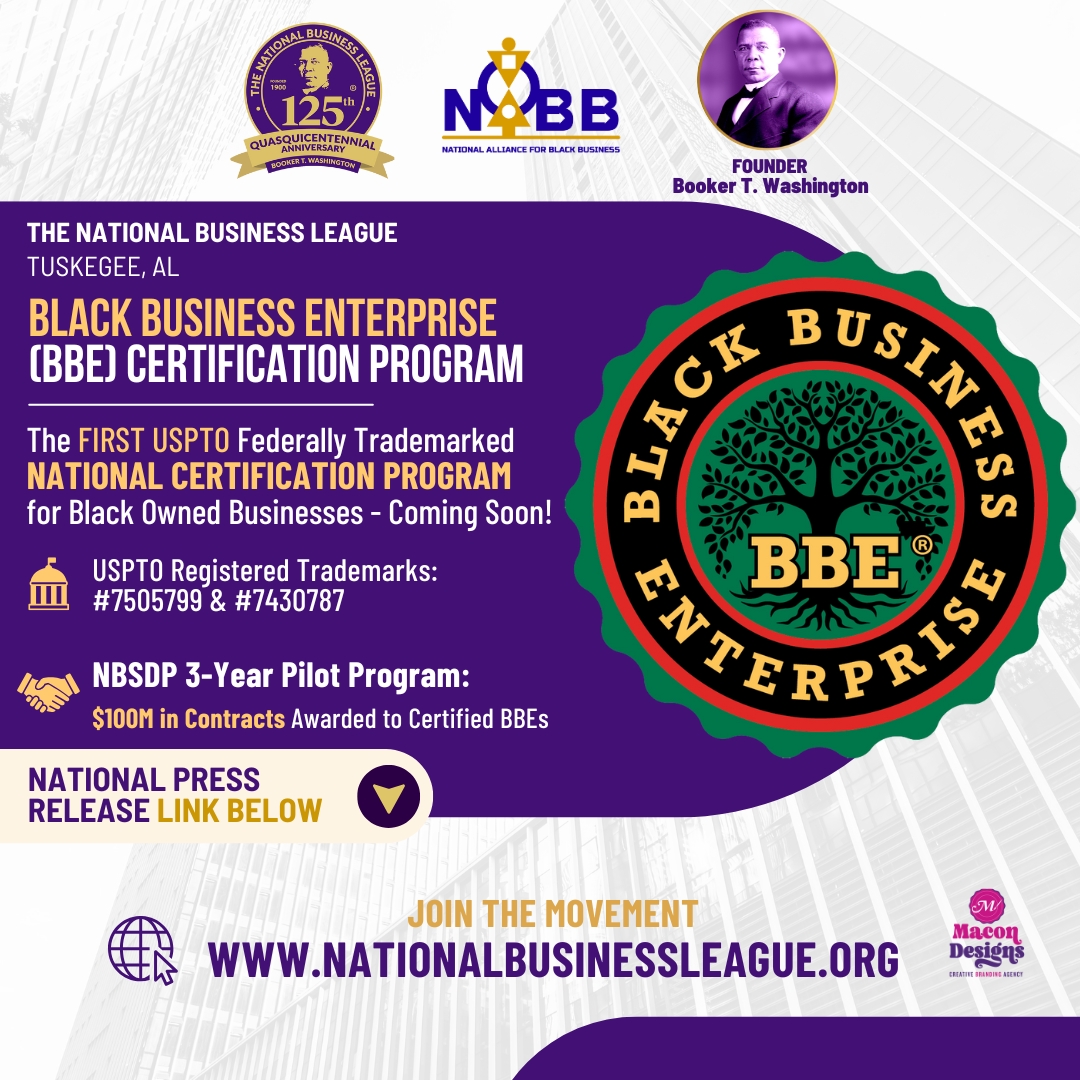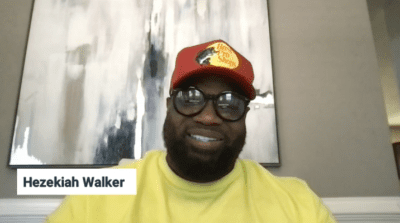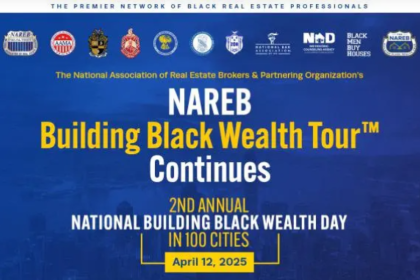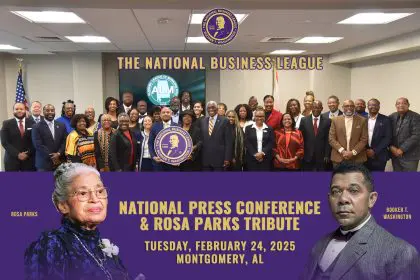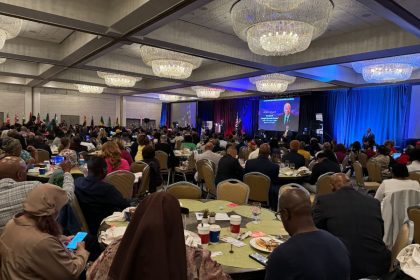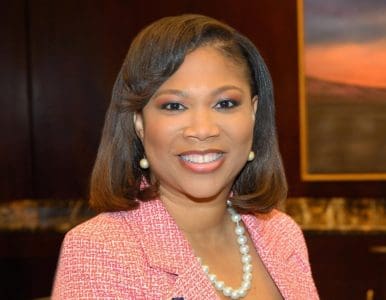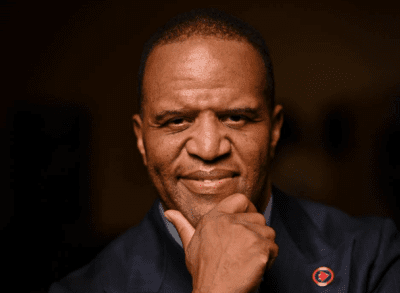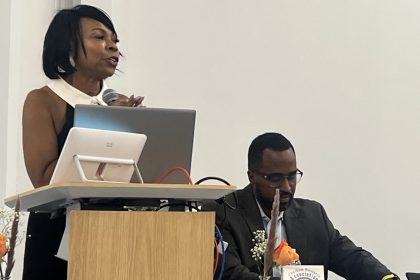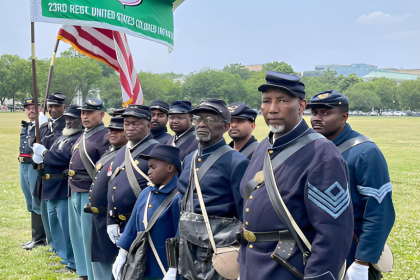Tuskegee, Alabama – In a historic move toward economic empowerment, the National Business League (NBL) has secured a USPTO Federal Trademark for the Black Business Enterprise (BBE) Certification under registration numbers 98127825 and 98130839. This landmark initiative seeks to redefine Black economic independence, challenging systemic inequities and promoting self-sustaining business ownership.
The announcement, which comes 61 years after the Civil Rights Act of 1964, reflects the ongoing struggle against economic exclusion. Despite decades of legislative efforts, Black entrepreneurs continue to face significant barriers. With this certification, the National Business League is spearheading a new economic movement aimed at fostering Black self-reliance and creating sustainable wealth.
A legacy of economic empowerment
The BBE Certification builds upon the vision of Booker T. Washington, the founder of the National Business League in 1900. Washington championed economic self-sufficiency, urging Black communities to develop their own businesses and industries.
Dr. Ken L. Harris, President and CEO of the National Business League, emphasized the need for a new approach, stating:
“Integration was never the solution to our economic disenfranchisement. The experiment has failed. DEI has failed. Affirmative action has failed. Black businesses and their communities have been left behind, and now we declare unequivocally: We will no longer beg for a seat at the table. We are building our own.”
The BBE Certification signals a shift from dependency models to ownership-driven economic policies, ensuring Black businesses gain direct access to government contracts, corporate partnerships, and investment opportunities.
Diversity, Equity, and Inclusion (DEI): A broken promise?
The rise of Diversity, Equity, and Inclusion (DEI) programs in corporate America was supposed to bring equitable opportunities for Black professionals and entrepreneurs. However, studies reveal that DEI efforts have largely failed Black communities, with economic disparities persisting despite decades of initiatives.
The harsh reality of DEI
- Black businesses receive minimal funding. In 2024, Black-owned startups secured only 0.12% of venture capital investments.
- Supplier diversity programs exclude Black entrepreneurs. Black businesses remain severely underrepresented in corporate contracts.
- The racial wealth gap persists. In 2023, the median net worth of a Black family was $24,100, compared to $188,200 for white families.
Despite being at the forefront of civil rights advocacy, Black entrepreneurs have received limited economic benefits from DEI programs. Instead, non-Black groups, particularly white women and other minorities, have gained the most advantages, leaving Black businesses struggling for resources.
A call for economic independence
The National Business League’s BBE Certification aims to replace DEI’s performative measures with concrete economic policies that prioritize Black business success. The certification creates a direct pathway for Black-owned enterprises to secure contracts, build networks, and foster long-term economic growth.
What the BBE certification offers
The Black Business Enterprise (BBE) Certification and Scorecard Program is designed to be a transformational tool for Black entrepreneurs. Unlike traditional DEI initiatives, the BBE Certification focuses on direct economic empowerment through:
1. BBE certification
- Open to businesses that are at least 51% Black-owned.
- Provides access to corporate, government, and supplier contracts.
- Ensures that Black businesses receive equitable economic opportunities.
2. BBE scorecard
- Tracks and reports how corporations and government entities engage with Black businesses.
- Holds institutions accountable for their economic commitments to Black entrepreneurs.
- Creates transparency in corporate diversity spending.
3. Proven results from the pilot program (2022-2025)
- Over $150 million in contracts secured for Black-owned businesses.
- Partnerships with General Motors, Ford, Toyota, Magna, DTE Energy, Comerica Bank, and Cummins.
- A growing list of corporate supporters committed to Black economic growth.
A national movement for Black economic freedom
The official BBE Certification launch will take place at the 125th National Black Business Conference in Atlanta, Georgia, serving as a rallying point for Black entrepreneurs. The event will also kick off the “Digitize 1 Million Black Businesses by 2028” campaign, an ambitious initiative to modernize and expand Black-owned enterprises across the country.
Dr. Ken L. Harris underscores the importance of this shift:
“Our liberation will not come from external validation but through our own hands, guided by our own vision. The BBE Certification is not just a business credential—it is a declaration of economic sovereignty.”
Why this matters
For centuries, Black businesses have been excluded from economic growth opportunities, with racial constructs and systemic barriers limiting access to resources. The BBE Certification represents a new chapter—one that places Black entrepreneurs in control of their own financial futures.
By moving beyond traditional minority business certifications, the BBE initiative ensures that economic benefits stay within Black communities, fostering sustainable wealth and generational progress.
A future built on Black economic power
The Black Business Enterprise (BBE) Certification is more than a business initiative—it is a movement toward true economic liberation. By rejecting the ineffective DEI frameworks and embracing self-reliance, the National Business League is empowering Black entrepreneurs to define their own economic destiny.
As Booker T. Washington’s legacy lives on, the BBE Certification offers a bold, transformative path for Black businesses, ensuring that economic equity is not just a distant goal, but a present reality.
About the National Business League (NBL)
Founded in 1900 by Booker T. Washington, the National Business League is the nation’s first and largest Black business trade association, dedicated to advancing economic equity for Black businesses. Visit www.nationalbusinessleague.org for more information.
About the National Alliance for Black Business (NABB)
Co-founded in 2022 by the National Business League, National Black Chamber of Commerce, and The World Conference of Mayors, the National Alliance for Black Business (NABB) unites Black organizations to promote growth and prosperity for Black businesses. Visit www.nationalallianceforblackbusiness.com.

